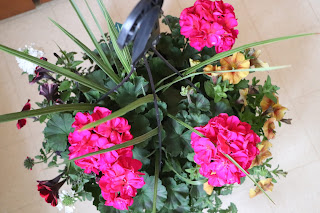There are so many things I could put into a blog post for Mother's Day. Memories of Mom-Eva, thoughts of love and gratitude for Mom-Ruthie (the best second mom ever) and Mom Martin (the best mom-in-law ever), funny sayings and exasperating moments arising from life with my offspring back when I was a young mother, lovely ways that my now-adult children are rising up and calling me blessed...you get the picture.
Photo Credit: Ken Martin
Among the habits and abilities one could pass along to children, there are certain skills that I think are beneficial for any young person to carry with them into adulthood - handy tools to pull out of one's carpenter apron in life, as it were. Here are three of them:
Skill #1. How to begin and maintain good conversation.
As an adult, one will likely encounter many situations in which steady and meaningful conversation is welcomed, if for nothing else but to override swallowing noises of guests at a Sunday dinner table, as my mom used to say. It can be of great benefit to have two or three conversation starters to pull out of one's bag to get things started. And just a hint on that - something I heard a long time ago and makes total sense to me: It is better to ask someone what they like about a thing, rather than if they like a certain object or situation. You'll be able to maintain a conversation much longer, for instance, if you ask a scholar "What do you like about school?" rather than "Do you like school?" Or, more appropriately for the season: "What do you like about your mother?" instead of "Do you like your mother?"
Skill #2. Knowing what to do when you're bored.
The current lockdown aspect of the COVID-19 pandemic has likely brought out the boredom feature of everyday life in many a household. What better time is there than now for honing the skill of coping or even thriving when bored? "Go read", "Here, I'll give you a chore to do", "Let's play a guessing game" were some of my mom's responses when I or one of my siblings posed the question of "I'm bored - what can I dooooo?" These suggestions join a host of possible ways to occupy one's body and mind in a meaningful way during a time of potential drudge and laziness. Learning to recognize the onset of boredom and knowing how to implement such boredom busters as reading, doing crafts, working on a project, engaging in hobbies, playing board games, writing, doing jigsaw puzzles, etc. is a skill worth developing. And, if all else fails, one can always resort to playing with words!
There are ever so many good uses for knowing how to process, clarify, record, document and remember something by writing it down. The older we grow, the more we realize that we will tend to forget the details of life happenings if we don't write them down as soon as possible after they happen. Journaling is a great way to practice this skill and one can begin it already at a young age. Making lists, using a planner, taking notes, and recording data are other great habits to develop along the writing lines. My sisters and I used to chuckle at our mom's propensity for splashing the name and date in magic marker seemingly on every gift or item she purchased, but now we find ourselves doing similarly. Is this for nostalgia's sake, or did her writing habits rub off on us? Even though she's been gone 25 years now, I keep thinking of things she taught me that I want to always remember, and to pass on to my children. Perhaps I'd better go write them down!
Are there things you would add to this list? What do you consider essential skills to pass on to the younger people in your life?








Yes, all good. I just recently learned a gracious way to end any argument (how useful!) by saying "I could be wrong". A possible addition to your good list.
ReplyDeleteThat is an excellent addition!
Delete